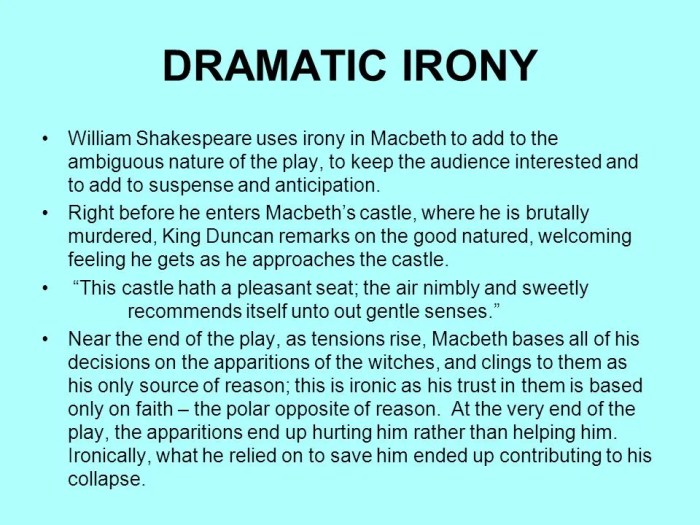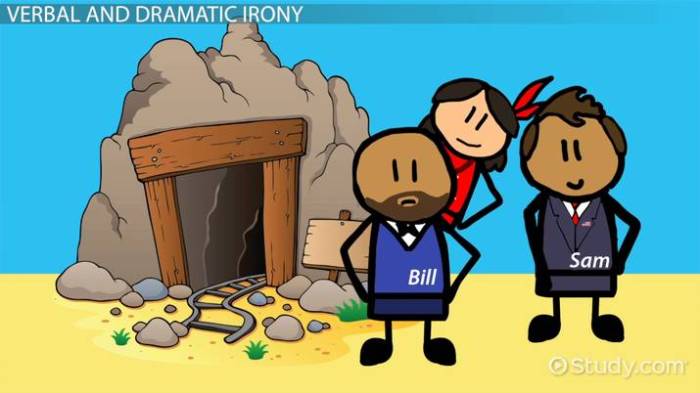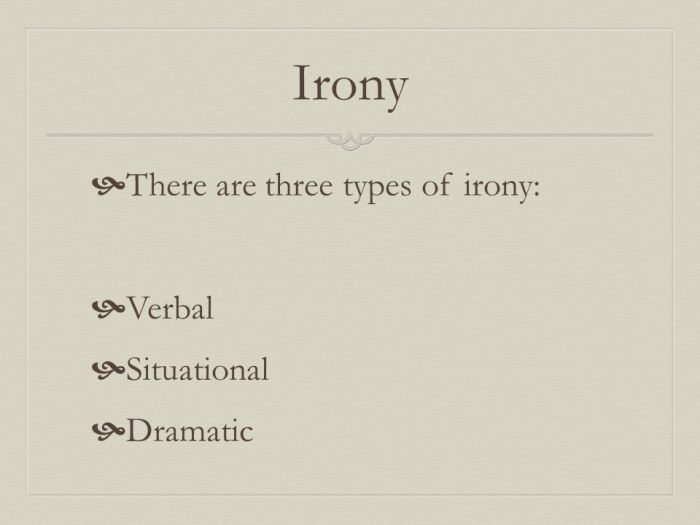Dramatic irony in lord of the flies – Dramatic irony in “Lord of the Flies” serves as a captivating narrative device that immerses readers in a world of intrigue and unexpected turns. This literary technique, where the audience possesses knowledge that the characters lack, propels the plot forward and heightens the suspense.
William Golding’s classic novel, “Lord of the Flies,” masterfully employs dramatic irony to explore the complexities of human nature and the fragility of civilization. As the story unfolds, readers become privy to information that the characters themselves are unaware of, creating a sense of anticipation and unease.
Dramatic Irony: Definition and Significance

Dramatic irony occurs when the audience or reader possesses knowledge that the characters within a literary work do not. This discrepancy creates a sense of suspense and engagement, as the audience anticipates the consequences of the characters’ actions while the characters themselves remain oblivious.
Dramatic irony enhances reader engagement by allowing them to experience the events of the story from a privileged perspective. It creates a sense of suspense and anticipation, as the reader eagerly awaits the moment when the characters discover the truth.
Furthermore, dramatic irony allows authors to explore the complexities of human nature and the consequences of our actions.
Dramatic Irony in Lord of the Flies
William Golding’s Lord of the Fliesis a classic example of a novel that employs dramatic irony to great effect. The novel follows a group of British boys who are stranded on a desert island after their plane crashes. As the boys attempt to establish their own society, they gradually descend into savagery and violence.
One of the most striking examples of dramatic irony in the novel is the boys’ belief that they are being watched over by a mysterious beast. The reader, however, knows that the beast is merely a figment of the boys’ imaginations.
This discrepancy between the boys’ knowledge and the reader’s knowledge creates a sense of suspense and foreboding.
Examples of Dramatic Irony in Lord of the Flies
- The boys’ belief that they are being watched over by a mysterious beast
- Jack’s secret desire to become chief of the island
- Ralph’s inability to control the other boys
- The death of Piggy, which symbolizes the loss of innocence and reason
Symbolism and Foreshadowing through Dramatic Irony
Dramatic irony is also used in Lord of the Fliesto foreshadow events and reveal deeper meanings. For example, the conch shell, which represents order and civilization, is eventually broken. This event foreshadows the boys’ descent into savagery.
In addition, the island itself can be seen as a symbol of human nature. The boys’ initial attempts to establish a democratic society fail, and they eventually succumb to their primal instincts. This suggests that human beings are inherently flawed and that civilization is a fragile construct.
Commonly Asked Questions: Dramatic Irony In Lord Of The Flies
What is the definition of dramatic irony?
Dramatic irony occurs when the audience or reader has knowledge that the characters within the story do not, creating a sense of suspense and anticipation.
How does dramatic irony contribute to the plot of “Lord of the Flies”?
Dramatic irony drives the plot forward by creating tension and suspense. It allows readers to anticipate events that the characters are unaware of, intensifying the emotional impact of the story.
What are some examples of dramatic irony in “Lord of the Flies”?
One instance of dramatic irony occurs when the boys discover the dead parachutist, unaware that he was a symbol of rescue. Another example is when Piggy realizes the true nature of Jack and his followers, while the other boys remain oblivious.

